Quick Take
- Peptides are tiny protein fragments that can signal skin cells to boost collagen and elastin.
- They work by stimulating growth factors and slowing enzymes that break down matrix proteins.
- Topical and oral peptide formats exist; choose products with proven concentrations (2‑5%).
- Most peptides are safe, but patch‑test before full use.
- Future labs are creating AI‑designed peptides for even faster rejuvenation.
When you hear the word peptides in a serum label, you might wonder if it’s just hype. The short answer: yes, peptides can genuinely help smooth fine lines and lift sagging skin. Let’s break down why they matter, how they act, and what you should look for when buying a product.
What Are Peptides?
Peptides are short chains of amino acids that act as messengers between cells, telling them how to behave. In skincare, they are engineered to mimic signals that naturally occur during wound healing or tissue remodeling. When applied correctly, they can jump‑start the skin’s own repair engine.
How Peptides Influence Wrinkle Formation
Wrinkles develop when the skin’s structural proteins-mainly Collagen a fibrous protein that provides tensile strength. and Elastin an elastic protein that allows skin to return to shape.-break down faster than they’re rebuilt. Two key biological players drive this imbalance:
- Matrix metalloproteinases (MMPs): enzymes that chew up collagen and elastin, especially after UV exposure.
- Reduced Growth factor signaling molecules that stimulate new protein synthesis. production as we age.
Specific peptides intervene in both pathways. Some, like copper peptide‑1, act as antioxidants and directly inhibit MMP activity. Others, such as palmitoyl pentapeptide‑4, bind to cell receptors and boost growth factor release, prompting fibroblasts to lay down fresh collagen.
Key Peptide Types Used in Skincare
| Peptide | Primary Mechanism | Target Protein | Typical Concentration | Claimed Benefit |
|---|---|---|---|---|
| Palmitoyl Pentapeptide‑4 | Stimulates TGF‑β signaling | Collagen | 2‑5% | Reduces fine lines, improves firmness |
| Acetyl Hexapeptide‑8 | Mimics SNAP‑25 fragment | Muscle contraction | 5‑10% | Softens expression lines ("Botox‑like") |
| Copper Peptide‑1 | Antioxidant + MMP inhibition | Collagen & Elastin | 0.1‑0.5% | Accelerates wound healing, lifts skin |

Delivery Methods: Topical vs Oral
Not all peptides survive the journey to your skin cells. The two main delivery approaches differ in bioavailability and convenience.
Topical peptide a peptide formulated in creams, serums, or masks, designed to penetrate the epidermis. Usually paired with liposomal or peptide‑carrier systems that boost absorption. Look for words like "encapsulated" or "nano‑lipid" on the label.
Oral peptide supplement a capsule or powder containing peptides stable enough to survive digestion. These often use proprietary protease‑resistant sequences. While systemic distribution can benefit the entire body, results on facial skin tend to be slower compared to direct topical application.
Practical Tips for Choosing Peptide Products
- Check the concentration: effective ranges are 2‑5% for collagen‑stimulating peptides and 5‑10% for muscle‑relaxing variants.
- Confirm delivery tech: liposomes, phospholipid vesicles, or micro‑emulsions increase skin uptake.
- Pair with complementary actives: Vitamin C stabilizes collagen; niacinamide supports barrier health.
- Look for clinical backing: studies published in dermatology journals (e.g., J. Cosmet. Dermatol.) give credibility.
- Patch‑test: apply a small amount on the jawline for 48hours to rule out irritation.
Safety, Side Effects, and Common Myths
Peptides are generally well‑tolerated because they’re made of the same building blocks as natural skin proteins. However, a few precautions are worth noting.
Excessive use of high‑dose copper peptide can lead to temporary redness due to its vasodilatory effect. Also, peptides do not replace sunscreen; UV radiation still drives MMP production and free‑radical damage.
Myth busting:
- Myth: Peptides are the same as hormones. Fact: Peptides are short chains; hormones are larger and act systemically.
- Myth: All peptide serums work instantly. Fact: Visible results usually appear after 8‑12weeks of consistent use.
Future Trends in Peptide Skincare
Researchers are now using AI to design peptides that bind more tightly to specific skin receptors, shortening the time needed for collagen synthesis. Early trials with “bio‑engineered” peptides show up to 30% higher collagen output in vitro.
Another exciting direction is peptide‑based vaccines that train the immune system to produce its own anti‑aging factors, though these are still in experimental phases.

Frequently Asked Questions
Can I use peptide serums together with retinol?
Yes, but apply retinol at night and peptide serum in the morning. Retinol can increase skin sensitivity, so give each product a few minutes to absorb before layering.
Do oral peptide supplements reach the skin?
Some do, especially if they are protected against digestive enzymes. Look for clinical data showing improved skin elasticity after 12‑weeks of oral use.
How long before I see results?
Most users notice smoother texture after 8‑12weeks of twice‑daily application. Deeper lines may take 4‑6months.
Are peptide products safe for sensitive skin?
Generally yes, but always perform a patch test. Avoid formulations with high alcohol or strong fragrances if you’re prone to irritation.
Do I need a peptide serum if I already use a collagen supplement?
Both can complement each other. Oral collagen provides building blocks, while topical peptides signal cells to assemble those blocks more efficiently.
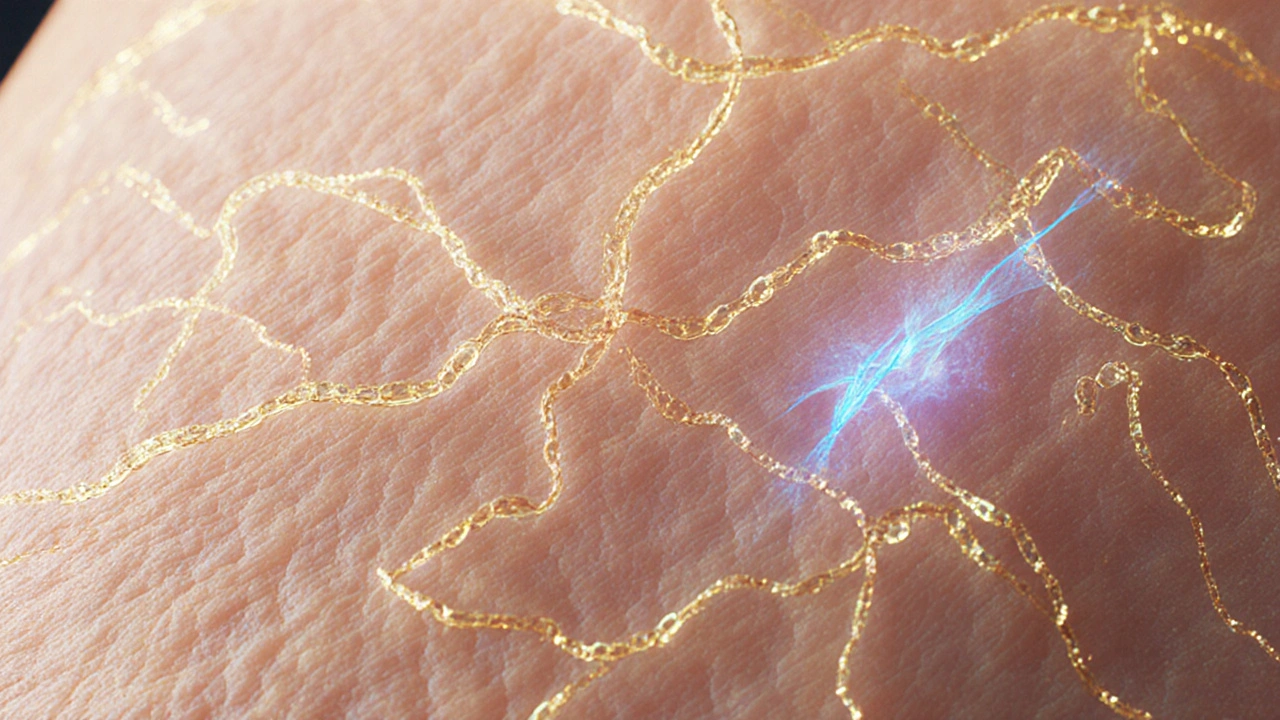

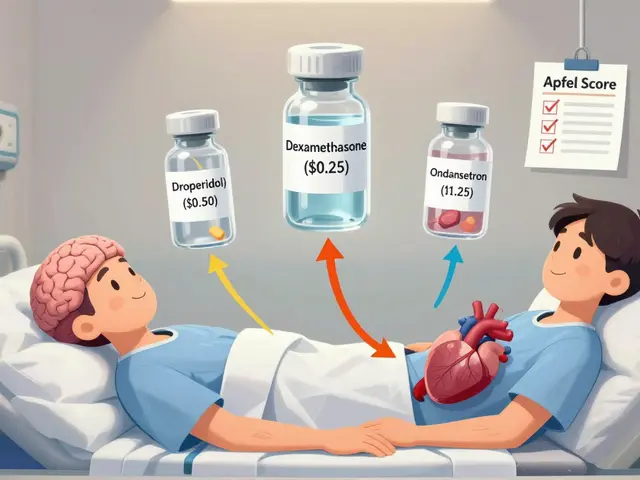

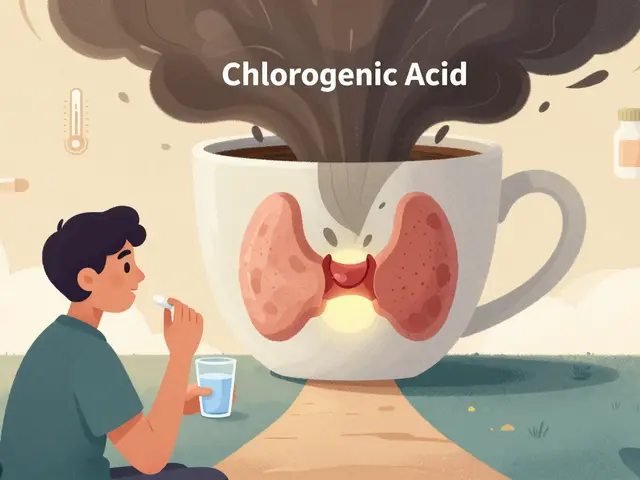
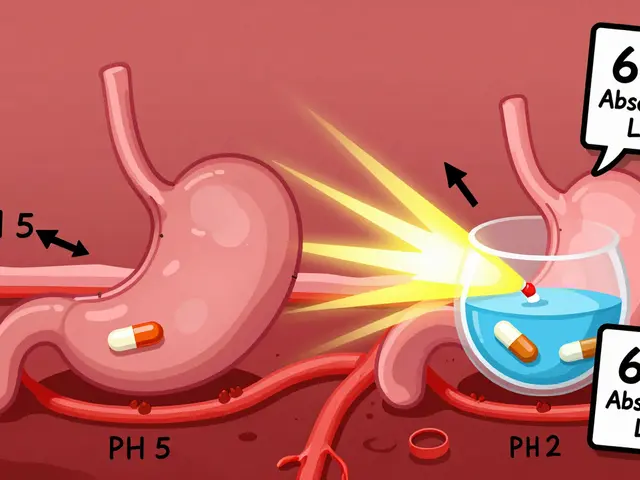

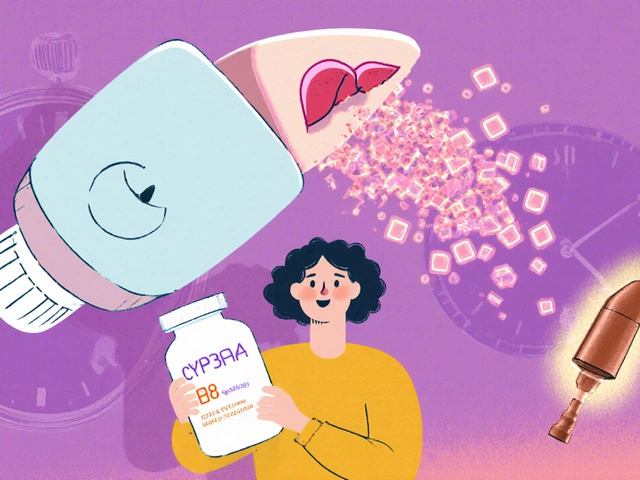



11 Comments
Peptides are a solid addition to an anti‑aging routine; they signal cells to produce more collagen and elastin, and they work best when paired with vitamin C and sunscreen.
Ah, the marvelous alchemy of peptides-tiny messengers that whisper to fibroblasts, urging them to rebuild the dermal tapestry; indeed, one could argue that we are witnessing a biochemical renaissance! 🌟🧪
When we contemplate the silent dialogue between skin cells, peptides emerge as the eloquent diplomats, negotiating the terms of renewal. Their presence reminds us that even at the microscopic level, communication is the cornerstone of vitality, and the skin, being our most visible organ, tells the story of that exchange.
The journey of a peptide begins in the lab, where chemists meticulously stitch together amino acids to mimic nature’s own signals.
Once formulated into a serum, these tiny chains must navigate the formidable barrier of the stratum corneum, a task achieved through advanced delivery systems like liposomes.
Upon reaching the viable epidermis, they bind to specific receptors on fibroblasts, effectively turning on the genetic switches that govern collagen synthesis.
This activation sets off a cascade of events, leading to the production of new collagen fibers that gradually replace the fragmented ones left behind by age and UV exposure.
Simultaneously, certain peptides such as copper‑peptide‑1 act as antioxidants, scavenging free radicals that would otherwise accelerate the breakdown of existing matrix proteins.
The dual action of building new scaffolding while protecting the old creates a synergistic effect that is more than the sum of its parts.
Clinical studies have shown measurable improvements in skin elasticity and wrinkle depth after consistent use for eight to twelve weeks.
However, patience is essential, as the remodeling of the extracellular matrix is a slow, deliberate process that cannot be rushed.
Patch‑testing remains a prudent step, especially for those with sensitive skin, to ensure that the formulation does not provoke irritation.
Incorporating complementary actives like vitamin C can further stabilize collagen, while niacinamide helps maintain the barrier function.
It is also wise to remember that peptides are not a substitute for sunscreen; UV radiation still drives matrix metalloproteinase activity.
The emerging field of AI‑designed peptides promises even more targeted interactions, potentially reducing the time needed to see visible results.
Some researchers are even exploring peptide‑based vaccines that could train the immune system to produce endogenous anti‑aging factors.
While these frontier technologies are exciting, they are still in early stages and require thorough safety evaluations.
Ultimately, a well‑formulated peptide serum, combined with a holistic skincare routine, offers a scientifically grounded path toward smoother, firmer skin.
Behold the elegance of copper‑peptide‑1, a molecule that not only beckons fibroblasts to lay down fresh collagen but also tempers the relentless march of matrix metalloproteinases; its duality is nothing short of theatrical. In the grand theatre of skin rejuvenation, such peptides assume the role of both hero and guardian, orchestrating repair while shielding the extracellular matrix from oxidative assault. When delivered via nanoliposomes, the bioavailability skyrockets, ensuring that the active ingredient reaches its intended cellular audience with maximal potency. Therefore, any formulation that neglects proper encapsulation is akin to a tragedy lacking its climax.
Peptides sound cool, but I’ll stick to my moisturizer 😂
If you’re considering a peptide serum, start by checking the concentration-look for 2‑5% for collagen‑stimulating peptides and 5‑10% for those targeting muscle‑relaxation. Next, verify the delivery technology; terms like “liposomal” or “nano‑emulsion” usually signal better penetration. Finally, pair the serum with a broad‑spectrum sunscreen to protect the newly formed collagen from UV‑induced degradation.
Topical peptides deliver results faster than oral supplements, so prioritize a well‑formulated cream if you want noticeable improvement within a few months.
Got my hands on a peptide serum last month 😊. The texture feels lightweight, and after a few weeks I see a subtle glow 🌟. Definitely worth the hype if you’re consistent.
The data on peptide efficacy emphasizes consistent use over several weeks; short‑term expectations are unrealistic. Patience and proper sun protection remain key.
While the prevailing discourse heralds peptide technology as a panacea for cutaneous senescence, one must consider the potential for undisclosed adverse effects concealed within the promotional literature. It is plausible that industry‑sponsored studies exaggerate outcomes, thereby engendering a consumer herd‑mentality predicated upon incomplete evidence. Moreover, the reliance on synthetic analogues may elicit immunogenic responses in a subset of individuals, a risk seldom addressed in mainstream marketing. Consequently, a discerning approach, encompassing independent scrutiny and circumspect skepticism, is advisable before committing to a peptide regimen.